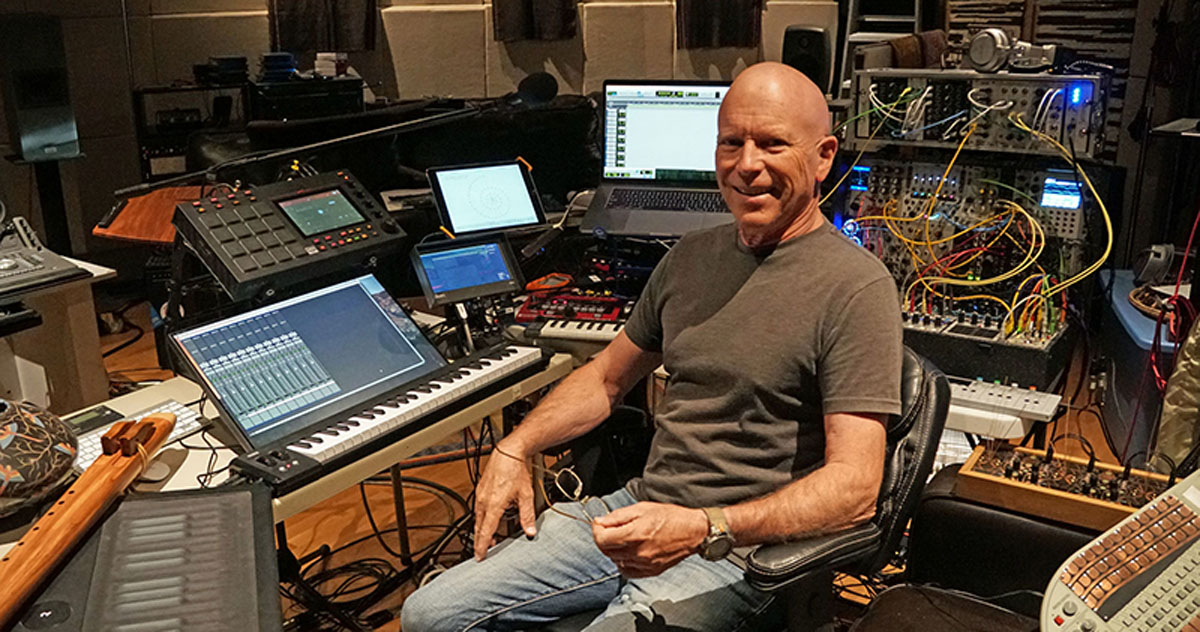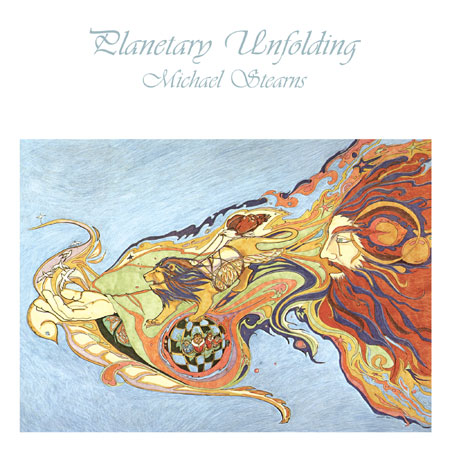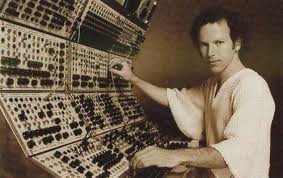A Cosmic Classic Re-issued, Michael Stearn's Planetary Unfolding. Echoes April CD of the Month
 Hear our interview with Michael Stearns in the Echoes Podcast on Thursday, April 7.
Hear our interview with Michael Stearns in the Echoes Podcast on Thursday, April 7.
This is a first in the annals of Echoes CD of the Month picks: a reissue of an album that was released 41 years ago. But Planetary Unfolding by Michael Stearns isn’t your normal album. It shook the electronic music world in 1981, especially the scene in Southern California, which at the time was a mecca of new electronic music from the likes of Steve Roach, Kevin Braheny and Richard Burmer. Along with Michael Stearns, those musicians formed something of a circular mentoring squad, influencing and helping each other in creating a wholly new musical sound.
Michael Stearns creates music that, to lift a phrase from Laurie Spiegel, is like the universe expanding. It is epic on a painting-the-sky level. That’s why he’s been picked to score IMAX movies like Chronos, Baraka and Samsara. These were films that, like Philip Glass’s Koyaanisqatsi, needed no narration because the music told the story.
 Stearns had been a working musician for years, first playing psychedelic music on guitar, and then moving into a more meditative sound, heard on early albums like Ancient Leaves, Morning Jewel and Sustaining Cylinders. Although aspects of these albums were pretty avant-garde, they found their initial audience in the nascent New Age scene, providing low intensity scores to explorations of the mind. But these dawn-of-the-new-age recordings didn’t quite prepare us for the grandeur of Planetary Unfolding.
Stearns had been a working musician for years, first playing psychedelic music on guitar, and then moving into a more meditative sound, heard on early albums like Ancient Leaves, Morning Jewel and Sustaining Cylinders. Although aspects of these albums were pretty avant-garde, they found their initial audience in the nascent New Age scene, providing low intensity scores to explorations of the mind. But these dawn-of-the-new-age recordings didn’t quite prepare us for the grandeur of Planetary Unfolding.
As a child of the sixties, artists like Jimi Hendrix and Pink Floyd were heavy influences for Stearns. But he also worked with renowned film composer Maurice Jarre, and former child actor and prodigy musician Craig Hundley, AKA Huxley, both of whom had a broad sense of dynamics and melody. You can hear those experiences in subtle ways on Planetary Unfolding.
But the biggest influence was his time spent at the Continuum Studio in Los Angeles. This was a workshop and meditation center where Emily Conrad taught her concept of meditation movement. It involved acolytes dancing free-form through the workshop space, eyes closed, tripping out to the movements of their own bodies and those of fellow seekers. Stearns performed live for people who were moving in trance-like meditations. This interaction with physical movement wasn’t dance, wasn’t tribal and wasn’t choreographed. Stearns orchestrated the flow of his music, yielding a feel on Planetary Unfolding music that exists in a state of always becoming. Even across epic crescendos, the music gives an impression of continual evolution. Continuum was also where he discovered the Serge Synthesizer through Kevin Braheny Fortune. It all comes together on Planetary Unfolding.
The opening track of Planetary Unfolding, takes the biblical title, “In the beginning. . . ” And indeed it is the creation of something magnificent as it emerges in a slow birth out of silence, gradually ascending, slowly intensifying synth chords propelled on a sample and hold pattern that gurgles beneath it. That track sets the table for a work that originally was one continuous piece, only split up for the sides of vinyl records and cassette tapes at the time.
The next piece evolves out of “In the beginning’s” cosmic dust with the title, “Toto, I’ve a feeling we’re not in Kansas anymore.” It’s an appropriation from The Wizard of Oz that is also fitting for the foreign landscape that Stearns drops you into. There are few anchors among the sustained synth pads and oscillating effects. It leaves you in wind-swept whispers before launching into the next piece. “Wherever two or more are gathered” is a kaleidoscopic tapestry of cascading synthesizers, doors-of-heaven chords and a tribal chant that sounds like it’s being transmitted from Alpha Centauri, transformed through the vapors of space and synthesizers,

Michael Stearns
“Life in the Gravity Well” opens what was originally side two, with an appearance of The Beam. It’s kind of a cosmic lyre; a 12-foot long resonant beam of extruded aluminum, strung with 24 piano strings. The Beam creates the warp drive slide that leads into the “Gravity Well.” (The Beam was actually used in different Star Trek soundtracks, but not for the warp drive sound). Then a voice from the heavens appears, a ghostly choir emerging out of an electronic swirl. The synth chords become grander as they accelerate through the stars, joined again by the voice, a siren call from the abyss.
Planetary Unfolding is full of small sonic details, odd sounds that may be electronic or acoustic in origin, and even birdsong. After the storm of “Life in the Gravity Well,” Stearns brings us back to a home we now experience differently, on “As the Earth Kissed the Moon.” Birds tweet and crickets chirp. Or are they actually the Serge synthesizer? A mockingbird, a real one, begins piping its song above the electronic fray. In another slow motion climax, spinning sequencers and church-like chords evolve into long synthesizer sustains and the heaviest pulse of the album so far, accelerating into an ecstatic release. Is this a gentle, quiet earth that Stearns has brought us to, or an altered state of consciousness?
The crescendo propels us into the next piece, “Something’s Moving.” The Beam once again sends us spinning into folded space, a rhythmic sequencer pattern powering a set of suspended synth chords against an electronic swirl that rushes though like mutant tumbleweed, before ascending into the heavens once again on a synth rocket, leaving silence behind.
Planetary Unfolding has been effectively out-of-print since the mid-1980s, although it was available in digital formats. This new reissue from the Projekt label finds the album remastered and in physical form for the first time in nearly four decades. It remains as timeless and breathtaking of a journey as it was in 1981.
Hear our interview with Michael Stearns in the Echoes Podcast on Thursday, April 7.
https://youtu.be/Gz6zrEwaSvI
